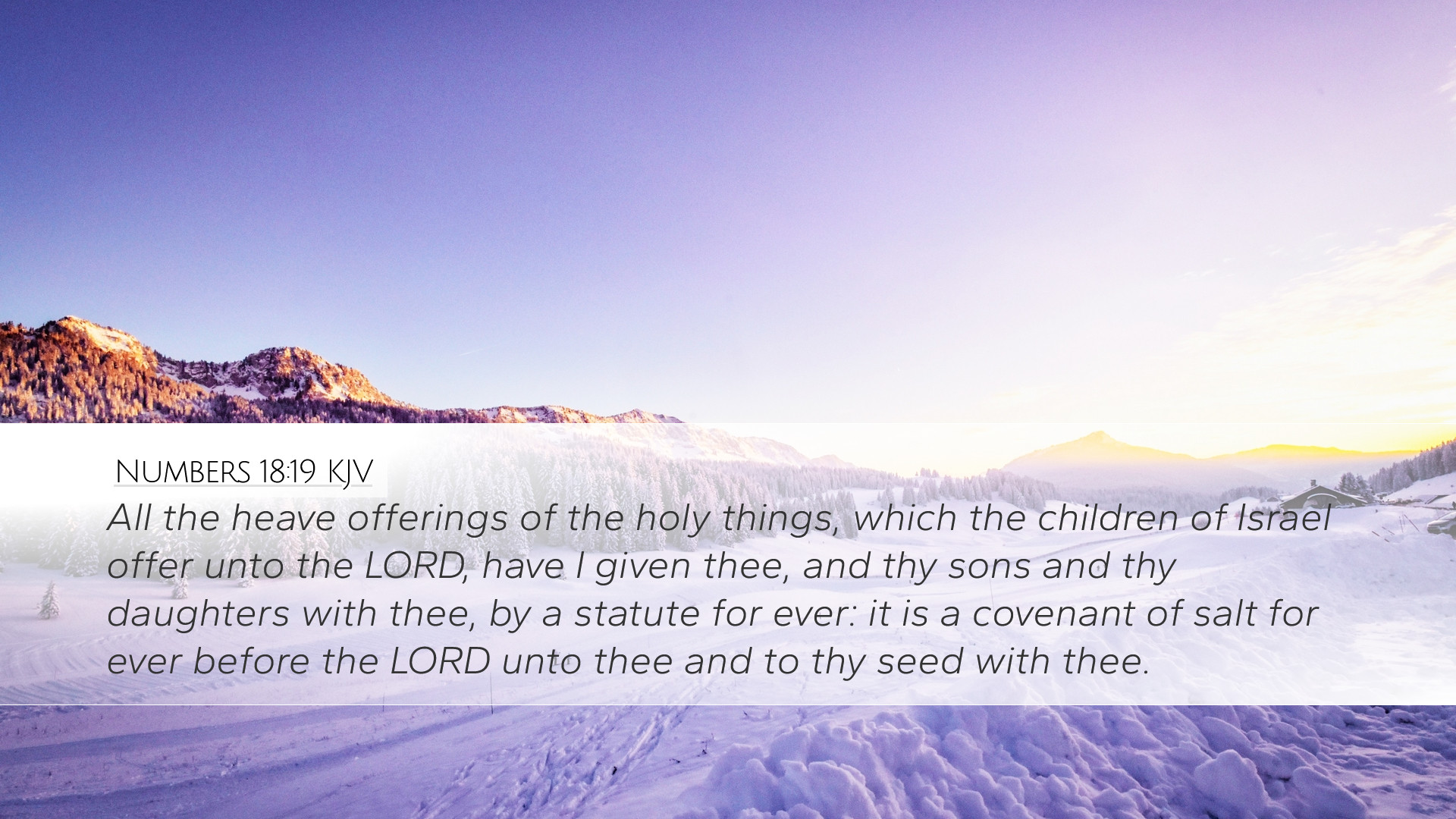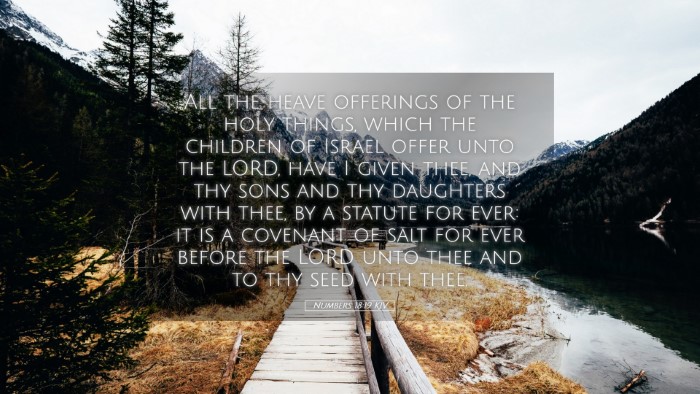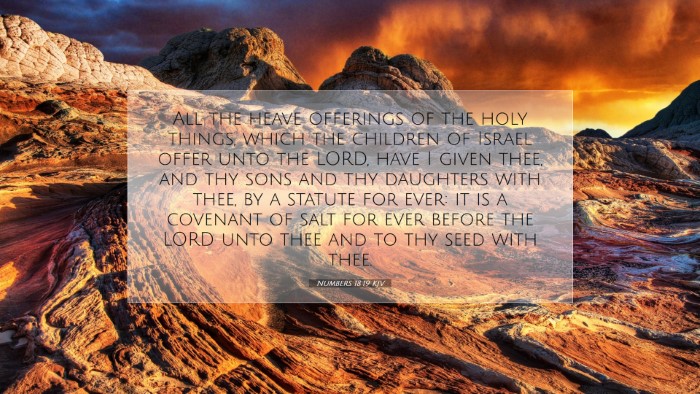Commentary on Numbers 18:19
Numbers 18:19 states:
"All the heave offerings of the holy things, which the children of Israel offer unto the LORD, have I given thee, and thy sons and thy daughters with thee, by a statute for ever: it is a covenant of salt for ever before the LORD unto thee and to thy seed with thee."
Introduction
This verse encapsulates the sacredness of the priestly role in Old Testament Israel and highlights the covenantal nature of God's promises. Various public domain commentaries provide insights into the theological, historical, and practical implications of this verse, especially concerning the priesthood and their divine provision.
The Sacred Portion
Matthew Henry emphasizes the significance of the 'heave offerings', referring to the special offerings designated for the priests. He writes that these offerings not only supply the needs of the priests but also symbolize the acknowledgment of God as the source of all provision. This act of offering was a means for the Israelites to express gratitude and maintain their relationship with God, thus recognizing that all things come from Him.
Covenant of Salt
Albert Barnes elaborates on the phrase "covenant of salt," which denotes permanence and purity. Salt, being a preservative, signifies the enduring nature of God's covenant with the priests. This covenant guarantees that the priesthood would have lasting support and provision as long as they fulfilled their duties in service to God. Furthermore, salt's association with sacrifices indicates a deep intertwining of worship and sustenance.
Significance of Salt in Covenants
- Permanence: Just as salt preserves food, the covenant illustrates that the priestly provisions are meant to endure through generations.
- Holiness: Salt represents purity, which aligns with the holiness required of the priests as they mediate between God and the people.
- Flavor: In a spiritual sense, the covenant enriches the life of the community, as the priests are meant to flavor the world with the teachings and presence of God.
The Role of the Priests
Adam Clarke notes the vital role that priests play in the spiritual economy of the Israelites. They are not merely functionaries of rituals but spiritual leaders and mediators between God and the people. Their sustenance from the offerings serves dual purposes: it supports their physical needs and acknowledges their spiritual service. This alignment ensures that the priests remain focused on their divine responsibilities without the distraction of seeking secular means of livelihood.
Theological Implications
- Divine Provision: The consistent provision for the priests underscores a critical theological concept: God’s commitment to those He calls into ministry. The sustenance provided to the priests reflects God’s faithfulness to His servants.
- Community Responsibility: The practice of offering reflects the community’s collective responsibility to support those who lead them spiritually. Thus, it cultivates a spirit of interdependence within the faith community.
Contextual Understanding
The context of Numbers 18 reveals God's detailed instructions concerning the duties and privileges of the Levites, specifically the priests, the descendants of Aaron. The chapter unfolds God's intention to ensure the proper functioning of the spiritual community and the maintenance of holiness among His people. This verse reinforces that intention by detailing specific provisions for the priests.
Historical Setting
- Levitical System: The priesthood was central to Israel's worship system, where Levites were entrusted with ministerial duties, serving in the tabernacle, and later, in the temple.
- Post-exilic Context: Understanding the verse also requires an acknowledgment of its implications during the post-exilic period, where re-establishing temple worship became vital for the Israelite community.
Practical Applications
This verse, while rooted in ancient Israel, has timeless applications for modern congregations, pastors, and communities of faith. The principles of support for those in ministry, the necessity of maintaining a covenant relationship with God, and the acknowledgment of God's provision remain relevant.
Encouragement for Pastors and Religious Leaders
- Trust in God’s Provision: Just as God provided for the priests, modern-day leaders can draw comfort from the assurance that God is faithful in their needs.
- Community Engagement: Pastors are encouraged to foster an environment where communities actively support their spiritual leaders, fulfilling the Biblical mandate of mutual care.
For Congregants
- Spiritual Responsibility: Congregants are reminded of their role in sustaining not just the physical needs of their leaders but also nurturing their spiritual growth.
- Value of Offering: The act of giving should be viewed as an offering to God and an investment in the ministry they believe in and the impact it has on their community.
Conclusion
Numbers 18:19 richly illustrates the divine orchestration of worship and the sustenance of those who serve in sacred roles. The insights from Matthew Henry, Albert Barnes, and Adam Clarke converge to illuminate our understanding of God’s enduring promises, the essentiality of the priestly role, and the community's responsibility towards its spiritual leaders. This verse remains a cornerstone for reflections on ministry, commitment, and the reciprocal relationship between leaders and the community of faith.


